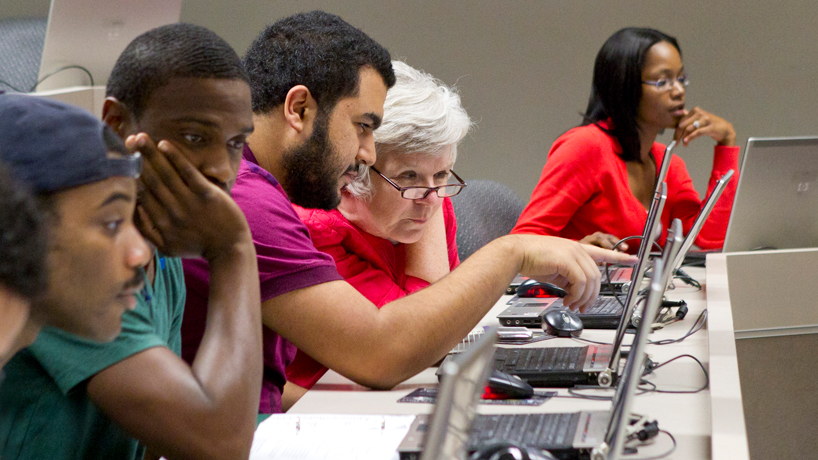
The Missouri Coordinating Board for Higher Education has approved UMSL’s new bachelor and master of science in cybersecurity degrees. Student admissions applications open June 24 for fall 2019 enrollment. (Photo by August JenneweIn)
The University of Missouri–St. Louis is addressing one of the most critical issues in cybersecurity – a skilled workforce.
Across the world, the cybersecurity talent shortage is nearing 3 million according to (ISC)2, a prominent industry certification body. The deficiency is particularly prevalent in Missouri, as CyberSeek rated the state’s talent supply “very low” but tracked more than 5,000 related job postings across Missouri from September 2017 to August 2018.
To fill this expanding talent gap, UMSL has launched new undergraduate and master’s degree programs in cybersecurity.
“There is an urgent need for high-quality and high-impact cybersecurity programs,” UMSL’s Cybersecurity Institute Director Shaji Khan said. “Our multidisciplinary degrees are student centric, dedicated to talent development and delivered through applied and industry-relevant learning experiences. UMSL graduates will have the education and training necessary to tackle some of the most significant challenges impacting our country.”
The bachelor and master of science in cybersecurity programs were recently approved by the Missouri Coordinating Board for Higher Education. Student admissions applications open June 24 for fall 2019 enrollment.
With its interdisciplinary roots, the cybersecurity program is a collaborative effort between the College of Arts and Sciences and the College of Business Administration. The Department of Mathematics and Computer Science and Department of Information Systems and Technology jointly deliver the degrees through a mixture of theoretical foundations and applied skills.
“The University of Missouri–St. Louis is excited to launch these necessary degrees,” Provost and Executive Vice Chancellor for Academic Affairs Kristin Sobolik said. “Our established cybersecurity minors and certificates have a proven record of success as demonstrated by their outstanding graduates and competitive designations from the National Security Agency and the Department of Homeland Security. These new degree programs will build upon that momentum and help transform the cybersecurity workforce in St. Louis and beyond.”
At the time of application for admission, students choose an emphasis area either in computer science or information systems and technology. The computer science emphasis provides enhanced technical depth while the information systems and technology emphasis offers stronger preparation for business and management aspects of cybersecurity.
“The Department of Information Systems and Technology has quickly become one of our greatest strengths in an established, globally recognized business school,” College of Business Administration Dean Charlie Hoffman said. “The two new interdisciplinary degrees in cybersecurity will strengthen UMSL and create a more cybersecure region, as 75 percent of our alumni stay and work right here in St. Louis.”
Federal, state and local governments along with employers have all joined in calls to create a robust talent pipeline given the importance of cybersecurity for national security and global competitiveness.
The UMSL degrees will equip graduates to pursue high-demand positions such as cybersecurity specialists, cyber defense analysts, cyber defense incident responders, information security analysts, vulnerability assessment analysts, security architects and a variety of other vital roles.
“With the elevated levels of technological dependence, cybersecurity has become an urgent concern for individuals, organizations and governments across the world,” College of Arts and Sciences Dean Andrew Kersten said. “UMSL will soon become a leader in addressing those challenges through research, community outreach and talent development.”














